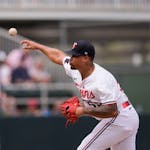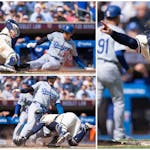FORT MYERS, FLA. – Trevor May threw fastballs and made a plan to throw changeups, the coaching staff sat in conference-room meetings to plan on-the-field workouts, half the bullpen unpacked bags and hustled out to make afternoon tee times, and Joe Mauer wandered into the clubhouse nearly a week early. The last day before baseball breaks out at Hammond Stadium passed with half-speed intensity but full-speed expectations.
"Our focus is to continue to play meaningful games in September, which begat meaningful games in October, and continue to build off the experience and success this team had last year," General Manager Thad Levine said by way of welcome to spring training. "The next step for our team is to play a home playoff game. But hopefully we can bundle that with playing a playoff series, and then we want to become much more relevant in the conversation about who's going to win the American League Central and have a little more control over our destiny than we do right now."
That's going to require a talent infusion into the pitching staff, and Levine, beginning his second season as one of Minnesota's roster builders, said he senses no immediate progress toward acquiring one from outside the organization. Yu Darvish's $126 million, six-year contract with the Cubs has not, as some had hoped, triggered a deluge of free-agent signings, and while the Twins remain as eager as ever to talk an unemployed starting pitcher into choosing Minnesota, they don't intend to significantly alter their current strategy: Stay patient.
"The supposition was that everyone would be in a feeding frenzy for Darvish and then move onto the next player, and then once that player signed, shift to the next. And so on. But that hasn't proven to be timely," Levine said of a free-agent crop that still includes worthy pitching pickups such as Lance Lynn, Jake Arrieta, Jaime Garcia and Alex Cobb. "We've had conversations … about free agents, but it's hard to handicap if they've really gained more steam. And if they have, it has to do with [the fact] that camp is starting."
There's no cutoff date for the Twins, Levine said, though now that pitchers and catchers officially reported Tuesday, they obviously would like to settle on a rotation as quickly as possible. But free agency remains the most likely avenue for an acquisition, Levine said, all but shooting down any rumors of big trades in the wind. As long as teams can simply spend money to add pitching, rather than surrendering increasingly valuable prospects, it's hard to get much traction on player swaps.
"The only thing slower so far than the free-agent market has been the trade market," Levine said. "With the wealth of free agents still out there, I don't think that's leaving teams to look at the trade market. … The prospect of weakening one part of your team to strengthen another is not appealing."
Pitchers and catchers will hold their first official workout Wednesday, and by the time position players join them next Monday, the Twins will have 54 players in camp. That's eight fewer than they had last year — the wooden temporary lockers in the middle of the clubhouse that minor leaguers normally use are missing this year — and that reflects the Twins' willingness to add players as camp goes on.
But it also reflects the unusually stable roster of position players that Minnesota brings to camp.
"It's a bit of a unique camp for us, in that the position player team, by and large, is returning, with very few exceptions," Levine noted. "While we don't have as many position players in camp, we also may not have as many bona fide competitions up for grabs."
They wouldn't mind adding another power hitter to the bench, Levine said, but that's an ambition that will almost certainly await resolution of the pitching problem. That's partly a reflection of their budget — adding one or two free-agent pitchers would probably push them to the upper limit of what they want to spend, particularly with some long-term contracts under consideration for young players — and partly a desire not to further clutter a rotation of potential designated hitters. But mostly, it's a reflection of their single-minded priority: pitching above all.
"We recognize we have holes, and our intent is not to play chicken [in negotiations] until the last [moment]," Levine said. "Starting [pitching] is more of a need, while a bat is more of a want. And we're going to address our needs first."






